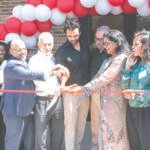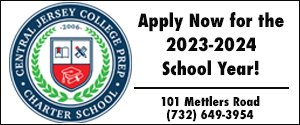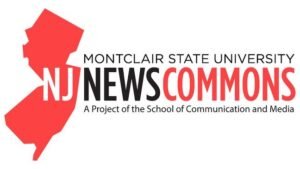Preliminary School District Budget Sees Slight Tax Reduction, Creation Of New Programs

Schools Superintendent John Ravally goes through the proposed budget at the special school board finance committee open hearing March 18 at Franklin High School.
Another increase in the value of township properties is contributing to a projected slight decrease in the school tax rate, the Board of Education’s business administrator said March 18.
BA Jon Toth’s comments came during an open meeting of the school board’s finance committee, during which schools Superintendent John Ravally and Toth brought board members and the public up-to-date on the budget that will be introduced on March 20.
The $165,027,353 estimated budget for 2019 is powered by a tax levy of $138,329,766, a $4.3 million increase over the 2018 levy.
The tax levy increase is offset by a $391,000 increase in the assessed value of township properties, from $9.8 billion in 2018 to $10.2 billion, Toth said.
That results in a decrease in the tax rate per $100 of assessed valuation of from $1.46 to $1.44 for the school portion of the municipal tax bill, he said.
That translates to a $45 decrease in the annual tax bill of a property assessed at the township average of $325,000, Toth said. The owners of property valued at $200,000 would see a decrease of $27 annually, he said, while the owners of property valued at $400,000 would see a $55 decrease.
Ravally said the main “challenge” the district faced in preparing this budget was an unexpected increase in the amount of payments to charter schools attended by district students.
He said that even though the district received an increase of about $65,000 in state aid, that was dwarfed by the $4.9 million increase in charter schools payments from Fiscal Year 2018 to Fiscal Year 2020, a 38 percent increase.
“With a $4.3 million increase in the charter school tuition line, that now represents about 11 percent of our operating budget,” he said. “Whenever you have a large increase in an expense like that, obviously it becomes a challenge, because it has to come at the expense of other things perhaps.”
Ravally said there were a number of areas affected by that extra payment.
“Fine, Performing and Visual Arts folks were hoping to expand programming at the Middle School level, and were looking for a couple extra staff to do that and some curriculum writing time,” Ravally said. “That’s on hold for now.”
In the area of English as a Second Language staffing, Ravally said the district is “providing what we need. We have an award-winning program and our supervisor was hoping to hire an academic coach for ESL, and looking for additional staff to lower class size, but we’re going to maintain class size if not add a few more.”
Ravally said providing more Language Arts and Science, Technology, Math and Engineering classes will be put on hold, “except for Latin, because that came at a very reasonable cost.”
Technology staff were looking for an additional technology coach, he said, and the district’s Director of Technology was looking for “some substantial dollars to upgrade the technology infrastructure.” Those plans will be put on hold, he said.
The budget does allow for some new programming, he said, such as an expanded Pre-K program, elementary guidance services, Science, Technology, Education, Arts and Mathematics (STEAM) courses, a Life Skills program at the Hamilton Street Middle School campus and a health professions academy.
Ravally said the district will look to see if it can “diversify and offer more” elementary school clubs.
The four-year-old Pre-K program will be expanded to 26 sections, he said, providing a total of 323 seats.
“That almost doubles where we were four years ago,” he said. “That’s a separate pot of money, but we did get about a $1 million dollar increase in pre-K aid.”
The summer STEAM program “will be a problem-solving approach at the elementary level,” Ravally said. “At the middle school level, they’ll be working in courses like aspects of video, where we’ll be working to incorporate technology in arts.”
The new Hamilton Street campus Life Skills program “is a transition program for students with special needs,” he said. “There’s a home economics class in that school still, we’re going to transition that into our life skills lab, and our special education secondary students, middle school and high school, will be utilizing that to begin their transition process to life after high school.”
The district is partnering with the Rutgers University School of Health Professions to offer the Health Professions Academy, Ravally said.
“We’re going to be following a cohort model, that means students will competitively apply to get into the academy, it will be a school-within-a-school model, held at Franklin High School,” he said. “Students in sophomore year will begin taking dual-enrollment courses that will be approved by the Rutgers School of Health Professions, and students will be able to earn college credits while here in high school. It’s a program focused very much on students looking at health care professions.”
“We’re going to offer 10 credits at first, and we’re going to hope to grow that program over the years to offer up to 34 Rutgers credits,” he said. “So we’re very excited about that.”
The district will continue to work with Equal Opportunity Schools, a program designed to increase enrollment in Advanced Placement courses.
“We’re working with the high school staff and students and leadership to up the ante, if you will, and provide more rigorous AP course work for students, and then enroll more students and prepare students to be more successful in AP as we up our enrollment.”
The district will also continue to support the Unified Sports Program, which fields a unified bowling and track team, Ravally said.
An aviation club at the high school will also be created under this budget, in cooperation with a local business, Ravally said.
“We’re partnering with MTBC Corp. to develop the aviation club,” he said. “They are generously ready to sponsor some of our students. As we work with (students) here in the classroom as they gain the necessary knowledge for a private pilot’s license, this corporation is generously ready to sponsor our students as they need the air time. There are lots of logistics still to work out.”
The district will also spend $795,000 to continue safety improvements to schools, including so-called “man traps” in school entrance ways to thwart potential intruders, and a radio system that will be able to be used district-wide.
In total, the district will allocate $5,356,000 in unspent 2018-19 money to its capital reserve. The projects set to be funded by the reserves are:
- Security upgrades for $750,000
- District paving for $585,000
- Parapet replacement at Pine Grove Manor School for $825,000
- Consolata property renovations for $1,500,000
- Hamilton Street Middle School campus window replacement for $1 million
- CLassroom floor replacement for $496,000
- HVAC repair for $200,000
The school board will formally introduce the preliminary budget at its March 20 meeting, then submit it to the Executive County Superintendent of Schools for review.
Final approval of the budget is expected on April 30. The budget takes effect in July.























































